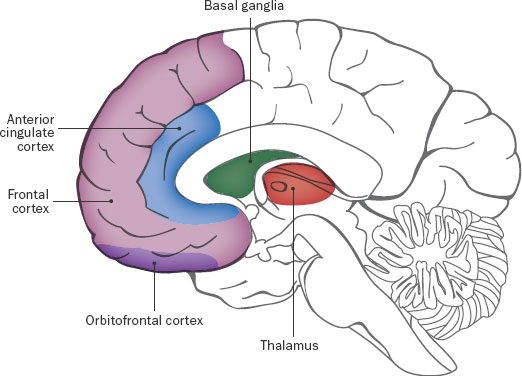
Obsessive-Compulsive Disorder (OCD)
- Home
- OCD
- What Causes OCD?
What Causes OCD?
While, we still do not know the exact cause or causes of OCD, research suggests that diversity in the brain and genes of those affected may play a role.

How OCD lives in the brain


Understanding the Biological Basis of OCD
Research suggests that OCD involves disruptions in communication between the frontal part of the brain and its deeper structures. These areas utilize a neurotransmitter known as serotonin, which acts as a chemical messenger. Brain imaging studies have shown that the brain circuits involved in OCD can normalize with treatments that either alter serotonin levels (such as serotonin reuptake inhibitors, or SRIs) or through Cognitive Behavior Therapy (CBT) and Exposure Response Prevention (ERP).
Is OCD Inherited?
Research indicates that OCD tends to run in families, suggesting a genetic component in the development of OCD for a person. However, genes are only part of the picture. Other factors, such as illnesses or everyday life stresses, may also trigger the activation of genes associated with OCD symptoms. Some experts believe that OCD starting in childhood may differ from OCD beginning in adulthood. For instance, a recent review of twin studies found that genetic factors play a more significant role in childhood-onset OCD (45-65%) compared to adult-onset OCD (27-47%).
Seeking Help
If you or someone you know is struggling with OCD, it is important to seek professional help. As a Registered Social Worker in Ontario who is
passionate about OCD, I am here to provide therapeutic support and CBT/ERP treatment.
Please feel free to contact Pothos for more information or to schedule a consultation.

Let's Connect
We know that finding the right therapist can feel overwhelming. If you're struggling with navigating various difficulties and stressors in your life and want support finding a different path, please reach out to us so we can book a brief call.
During this informal conversation, we can discuss your needs and practical considerations (such as fees, timing of sessions etc.) and determine together whether Pothos is the right fit for you moving forward.
Based on our discussion, if we discover that the fit isn't right, we can provide suggestions for alternative options and considerations.
info@pothoscounselling.com
(249) 505-0588
Please ensure that when you send emails to Pothos Counselling and Consultation Services, that you check your junk folder for our response, sometimes correspondence gets interrupted or held up as a result